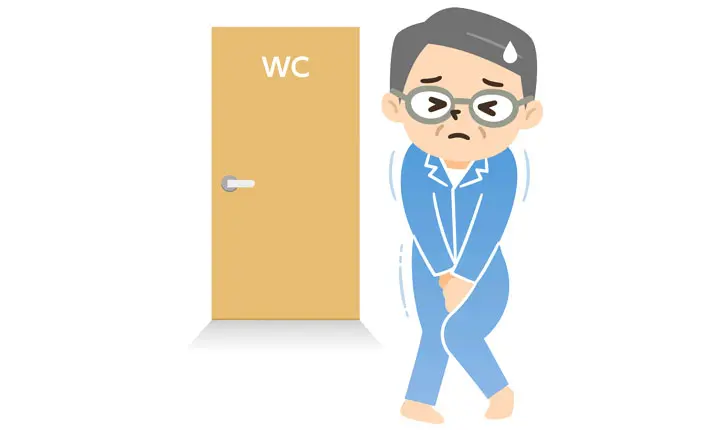Passing urine is one of the ways your body eliminates waste and excess water.
Urine is produced when blood gets filtered by the kidneys. These waste products and excess water then travel down through the ureters, the tubes connecting your kidneys to your bladder, and are stored in your bladder until it’s time to relieve yourself.
The majority of urine is 95% water, with the remainder made up of thousands of compounds that your body doesn’t need. Under normal circumstances, urine is typically a light shade of yellow with no particular odour.
Any changes though should be noted as it can indicate the condition of your body, and hint at signs that something may not be right.
Key signs to look out for include the colour and smell of your urine, the presence of blood being passed with your urine, the frequency which you need to relieve yourself, and whether there’s any pain, discomfort, or unusual sensation that is felt when you make that bathroom stop to relieve yourself.
What the colour of your urine may indicate
‘Normal’ urine is typically light yellow in colour with no particular odours. However, this may be altered by foods you eat or medications you take may have taken. Such changes are usually temporary. Beets, for example, are known to give urine a brown or reddish tint, while petai adds a (thankfully, brief) pungent odour.
Those who rely on antacids may observe a bluish tint in their urine, while certain supplements can give your urine a bright yellow colour that almost looks neon too. But if you can’t attribute a change in colour to anything temporary and benign like this, consider speaking with your doctor about the following possible medical conditions based on the colour you see.
White urine – This is often a sign of overhydration. Consider drinking a little less water as overhydrating can have adverse effects on your body too.
Orange urine – If you notice a deeper yellow, or even orange-coloured urine, it could point to either dehydration from drinking insufficient fluids. In severe circumstances, it could even point to an underlying liver condition.
Dark urine – Dark coloured urine can also indicate severe dehydration. If you have been drinking enough water, but still notice a persistent dark colouration when you pass urine, it could point to a build-up of waste and toxin in your body that should be promptly checked out by a doctor.
Dark brown urine – If your urine is a deep brown colour, it could indicate increased levels of bile, which could be caused by kidney or liver disease.
Red/Bloody urine – You could have blood in your urine due to over-exercise or if you’ve suffered a recent injury to your kidney. However, it could point to a medical condition that requires immediate attention. This could be a urinary tract infection, especially when red or bloody urine is accompanied by a painful burning sensation when passing urine. More serious conditions causing blood in the urine include a possible kidney infection, kidney disease, an enlarged prostate, bladder cancer or sickle cell anaemia.
What cloudy or foamy urine may indicate
Beyond the colour of pee, the clarity of urine is also something to take note of. In particular, cloudy or foamy urine may indicate other underlying conditions that can be easily tested and diagnosed with a urine test by a urologist.
A blockage – If cloudy urine is accompanied by an urge to pee, but not much relief or flow happens when you actually begin to relieve yourself, it could be a sign of a blockage. This may be caused by a number of conditions, including an enlarged prostate, kidney stones, urethral blockage or blood clots, and even bladder cancer, among other conditions.
Kidney disease – If your urine appears foamy, it can indicate too much protein in your urine. There are a few conditions that could be the cause, including an early sign of diabetic kidney disease. If this is noticed along with swelling in the face, or limbs like the ankles and feet, muscle cramps and itchy skin, it may be a particular type of kidney disease called glomerulonephritis.
Lupus – Cloudy urine can also be a sign of lupus, an autoimmune disease that mostly affects women. While there isn’t a cure for lupus, the condition can be managed effectively with medication when diagnosed early.
Frequency of urination
The frequency with which you need to urinate, whether too often or not often enough, also leaves clues about a potential underlying medical condition.
If there has been a recent increase in the number of times you use the restroom, you should consult with your urologist to rule out the following:
- Incontinence
- Bladder infection
- Uterine prolapse
- Kidney disease
- Diabetes
- Pregnancy
- Enlarged prostate
When you aren’t peeing often enough
If you feel you don’t urinate as much as you should, it may simply be that you are not taking enough fluids. The Singapore Health Promotion Board recommends drinking between 7 – 8 glasses (or more) of water each day, especially if you’re active on a swelteringly hot day.
However, talk to your doctor if the problem still persists with increased fluid intake. It could be a sign of an obstruction or blockage as mentioned above.
What to do if you suspect something is wrong?
If you notice a sudden change in the look of your urine or the way you pee and it doesn’t go back to normal within a day or two, consider a consultation with a urologist as they will be able to help you address the problems in the urinary tract.
Screening options targeted at determining the cause of these symptoms can range from simple urine and blood tests, to more definitive tests that look into one’s kidney function and prostate-specific antigens. The results will enable your urologist to make an accurate diagnosis and come up with a suitable treatment plan.
Screening doesn’t necessarily have to take place only when something feels wrong. This is where a regular health screening can help your doctors spot potential problems early and take active steps to prevent them from worsening.














